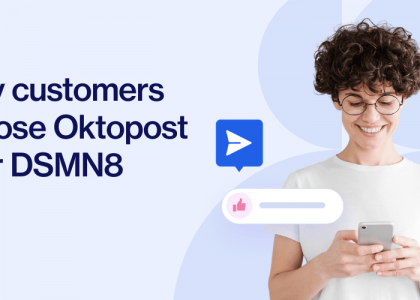In B2B marketing, investing in the ability to identify intent signals has become a popular strategy for capturing early interest from target accounts and steering prospects through the buying journey. Yet, I would like to debate the actual value of intent signals actual value and effectiveness.
What if there was a more sustainable way for B2B marketing to initiate the intent to buy instead of capturing it? The power of building a trusted community around your brand may be more effective. In this blog, I want to debate whether fostering a community-centric approach is more valuable than chasing intent but also essential for long-term success in B2B marketing.
The Limitations of Intent Signals
Intent signals can offer glimpses into potential buyer interest, but several vital limitations often hamper their effectiveness:
Ambiguity of Signals:
Actions like website visits or content downloads sometimes indicate a company’s readiness to buy. These behaviors indicate casual interest or initial research rather than serious purchase intent (Forrester).
Data Quality and Accuracy:
The methods used to collect intent data can vary widely, leading to inaccuracies and misinterpretations. Not all intent data is equal, and treating all sources the same can result in flawed strategies. (Forrester).
Privacy Concerns:
With the growing emphasis on data privacy, heavily relying on third-party intent data can pose compliance risks. This can lead to legal issues and harm your brand’s reputation. (Forrester)
Time Sensitivity:
Intent data is highly time-sensitive. Signals can quickly become outdated, resulting in missed opportunities if not acted upon immediately. (Forrester)
The Power of Building a Trusted Community
Creating a vibrant community of professionals around your brand’s mission fosters long-term engagement and interest, offering benefits that surpass the fleeting insights from intent signals.
Here’s why focusing on community building is crucial:
Ensuring Ongoing Engagement:
A thriving community guarantees sustained interaction with your brand. Community members are likelier to engage with your content, join discussions, and attend events, fostering more profound, more meaningful relationships.
Building Trust and Credibility:
Trust is the foundation of any strong community. You establish credibility that withstands market fluctuations and competitive pressures by consistently delivering value and engaging authentically.
Transforming Members into Advocates:
When professional prospect community members trust and value your brand, they naturally become advocates. They share positive experiences, refer others, and defend your brand against negative perceptions.
Gaining Valuable Customer Insights:
An engaged professional prospect community is a rich source of feedback and insights. Understanding your community’s needs and challenges helps you continuously innovate and improve your offerings.
Case Study: The Acme Company’s Community-Building Triumph
Acme Company, a leading technology firm, harnessed the power of a community-centric approach to achieve remarkable success. Acme Company focuses on building a strong community of individual professionals through consistent value delivery, engaging content, and personalized interactions. Acme Company boosted brand loyalty and saw higher conversion rates when community members were ready to purchase.
Acme company’s prospect community strategies
1. Deliver value consistently
It is crucial to provide valuable content and resources that address the needs and challenges of your target audience. Acme Company excelled at this with a steady stream of blog posts, whitepapers, webinars, and case studies that offered actionable insights and practical solutions.
2. Engage through multiple channels
Keeping the community connected across various platforms was a cornerstone of Acme Company’s strategy. Acme Company utilized social media, newsletters, webinars, and events to maintain engagement and foster strong relationships with its audience.
3. Personalize interactions
Tailoring interactions based on individual preferences and behaviors helped Acme Company build stronger connections. They achieved this through targeted email campaigns, personalized content recommendations, and one-on-one interactions at events or via customer support.
Acme Company’s success story highlights the profound impact of a well-executed prospect community-building strategy. It demonstrates how focusing on genuine engagement and personalized value can drive loyalty and conversions.
Why Over-Reliance on Intent Signals Can Backfire
False Positives
(A false positive is an incorrect indication that something has occurred or is present when it actually hasn’t)
Intent signals often lead to false positives, where the indicated interest does not translate into actual buying intent. This misalignment can save resources and opportunities to engage genuinely interested prospects.
Intent data needs more context
Intent data provides a snapshot of interest but needs more context to understand potential buyers’ underlying motivations and needs. This gap makes it challenging to tailor marketing strategies effectively.
Good, timely, and relevant intent data is expensive
Procuring high-quality intent data is costly. Given the uncertainties in ROI due to the reasons above, the financial burden may not justify the potential benefits.
Practical Steps to Building a Professional Prospect Community
1. Content matters. If you want people to keep reading it, make it valuable
Create content addressing your target audience’s pain points, challenges, and personas. These people will continue to read your content regardless of the company they work for, positioning your brand as a valuable resource and thought leader.
2. Don’t just publish- engage, answer questions, participate in conversations
Encourage interaction through forums, social media groups, webinars, and live events. Regular engagement keeps the community vibrant and active.
3. Personalize your interactions
Use data collected from your professional prospect community to personalize interactions. This will show that you care about their needs and preferences. For example, social listening can help you track what people are discussing.
4. Ask for feedback
Actively seek feedback from community members through surveys, polls, and direct conversations. Use this feedback to understand their needs and improve your offerings.
5. Recognize and reward
Acknowledge the contributions of active professional prospect community members. Offer incentives like exclusive content, discounts, or public recognition to foster loyalty and engagement.
Final Thoughts
While companies can use intent signals to identify purchase intent, their limitations make them less reliable than cultivating a well-established professional prospect community. Building a trusted professional prospect community around your brand provides sustainable engagement, trust, and loyalty, surpassing intent data’s fleeting benefits. By consistently delivering value, engaging through multiple channels, and personalizing interactions, B2B marketers can lay a strong foundation for long-term success.
In B2B marketing, the significance of building a professional prospect community that understands and trusts your brand cannot be overstated. A community-centric approach enhances your ability to identify and engage potential buyers and fosters the trust and loyalty essential for enduring success. Organizations can craft a more sustainable and effective marketing and sales strategy that drives growth and delivers exceptional value to their audience by prioritizing their professional prospect community building over solely relying on intent signals.





